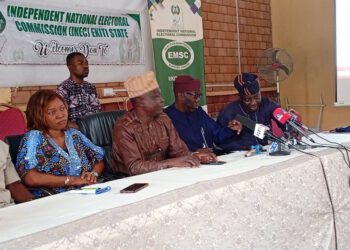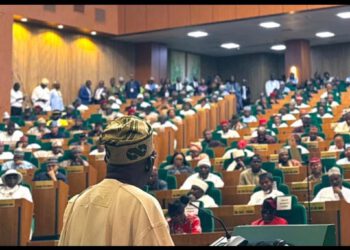In the last few days, the public space has been awash with the amendments to the Electoral Act by the National Assembly which has generated quite a lot of reactions from stakeholders that is in tandem with the spirit and letter of democracy in terms of discussions, debates, dialogues and other forms of civilized engagement.
However a very contentious issue in the ongoing amendment of the Electoral Act is the clamour for the electronic transmission of election results and this is one area of concern that the National Assembly needs to tread cautiously lest it be blackmailed and or intimidated to embark on a process that would eventually throw the electoral system and the country into unmitigated and unintended chaos in the long run.
The clamour for electronic transmission of results and the way and manner it is generating interest requires all stakeholders to put on their thinking cap to assess the viability or otherwise of this move.
One, if we may ask, in transmitting the election results electronically, is it going to be done via a mechanical devise or telephone modem to be provided by INEC and domiciled in INEC facilities solely?
Two, if the answer to the above is in the positive, how do we engender public confidence and accountability if INEC is to be solely in charge of a critical process of the electoral system, that even when it is done transparently and includes authentication of other stakeholders inputs through manual authentication of election results in which some stakeholders disappear or refuse to append their signature to manual result sheets when the outcome of an election does not favour their political party as we have witnessed in elections in our country?
Three, if INEC is going to transmit the results electronically, how do we ensure accountability and transparency in the process since we are asking if other stakeholders will be on that platform to oversee and ensure that no manipulation takes place or will INEC do it alone and when disputes arise, how can other stakeholders now have evidence to support or prove their cases at election petition tribunals?
Four, what network or connectivity would be provided to transmit the results electronically? Is it going to be from the GSM service providers network or is INEC going to install a system of connectivity existing outside of the telecommunication service providers across the country?
Five, can we guarantee the network connectivity of the systems whether INEC is providing one or making use of existing telecommunication service platforms across the country?
Six, if INEC is going to transmit election results electronically, then other stakeholders would be at a disadvantage most especially party agents to gather evidence to help their party cases at the election petition tribunals in case of a dispute since all evidence to substantiate their case would now be dependent on the information supplied by INEC.
Seven, if the election results are transmitted electronically, what happens to the information supplied if the primary source of the information is stolen, lost or damaged?
Most importantly, as lofty as the idea of the electronic transmission of election results is, a critical question to ask is, do we have the necessary infrastructure connectivity wise to run such a system, knowing fully well that a large part of the country don’t have telecommunication connectivity for whatever reason? Or would elections in such areas and where there is system failure either by natural cause or human deliberate action, be null and void since the outcome would be in contravention of the Electoral Act having not been electronically transmitted if the law is eventually passed and assented to?
In the final analysis, one would like to caution the National Assembly to exercise caution and not allow itself to be intimidated and or blackmailef to take a course of action, that would imperile our democracy in the long run, seeing that there are many T’ s to be crossed and i’s to be dotted if we are to have an electronic transmission of election results in our democracy, those clamouring for it, need to be educated and informed that this process is fraught with more danger and landmines than the existing manual process which involves authentication by stakeholders at every point and remains valid since the process is subjected to the checks and balances of the stakeholders who have copies and which is crucial in case.
To the National Assembly, please don’t succumb to the alarm of desperation of doom if we don’t have electronic transmission of election results as being bandied, it’s cheap blackmail.
God bless the Federal Republic of Nigeria.
Nelson Ekujumi




















